The National Museum of Egyptian Civilisation (NMEC) in Fustat on Sunday evening hosted a screening of the Netflix documentary ‘Unknown: The Lost Pyramid’. It was screened on the platform on July 3, starring famed archaeologists Zahi Hawass and Mostafa Waziry.
Most of the crew were present at Sunday’s event, including director Max Salomon.
Salomon expressed his happiness in working with the two Egyptian archaeologists. He said they were keen to not only compete with foreigners but to reclaim the science of Egyptology itself.
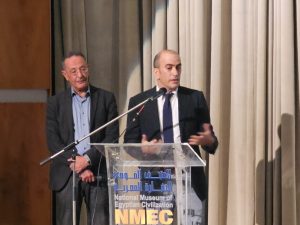
“I love Egypt. I would like to show this love for all workers in archaeology by highlighting not just the discoveries but all people behind them.
“I thank Dr Hawass and Dr Waziry for lifting up Egyptology,” Salomon added.
He said the film took 43 days in 10 months. It started in the fall of 2021 and was shot in two excavation areas in Saqqara, Gisr Al-Modier, led by Hawass and Bubasteion, led by Waziry.
It features Hawass hunting for the long-lost pyramid of a forgotten Egyptian king, while his protege and rival, Waziry, searches for an unlooted tomb in an ancient necropolis. Both teams race against the clock to see who will make the greater discovery and make their mark in history.
Waziry, who is Secretary General of the Supreme Council of Antiquities, said that the recent discoveries in the last few years were made by Egyptian missions, out of 250 foreign missions working in excavations from 50 countries.
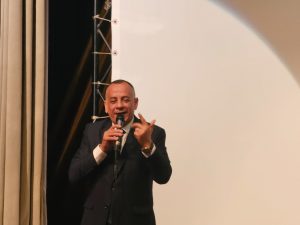
“For the first time in 120 years, the Egyptian mission succeeded in discovering four papyri; three in Saqqara and one and the first ever in Minya,” he said.
The previously discovered papyri was named after those who found them, who were foreigners. These four papyri were named after Waziry. They all contain chapters from the Book of the Dead.
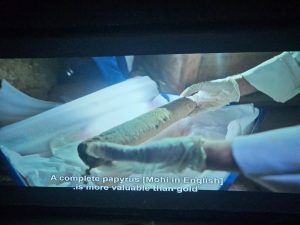
The Waziry one papyrus, which is 16-metre-long, is on display at the New Administrative Capital Museum, the second and fourth are on display in the Cairo Museum, while the third will be among Grand Egyptian Museum’s collections, he said.
Hawass said that since the documentary was first shown on 3 July it has become number on the platform worldwide, “something unique in the history of Netflix”.
“When I went to any bookstore, all the books were written by foreign archeologists. When I opened the TV, I saw foreign archeologists. Foreigners ruled, but we needed to compete with them. We need to be good like them,” he told the gathering.
“I wanted and was planning that one day I’m going to make a difference in Egyptology. One day my name will be written in history. And it happened,” he added.
Hawass said that archaeology in the past was like Raiders of the Lost Ark.
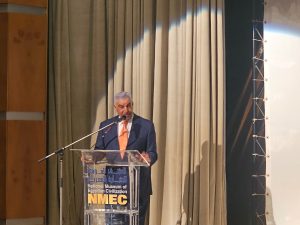
“Using axes, taking sand, and putting it away, we found a tomb. But now archaeology is completely different,” he said.
“Archaeology is a science. It’s not digging to find the tomb, no. It’s digging to find history and to rewrite history.”
Many ministers and foreign ambassadors attended the film screening.
Prior to the start of the event, NEMC Managing Executive Director Ahmed Ghoneim requested the attendees to stand for a moment of silence in sympathy for those who died in Gaza.
The film was shown within the Cinema and Civilisation initiative, launched by the NMEC within the framework of cultural and artistic programmes to revive the art of cinema.



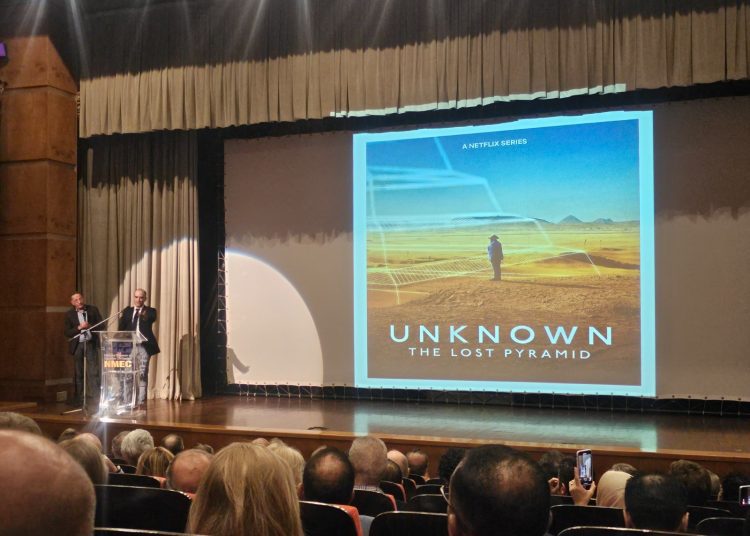


Discussion about this post